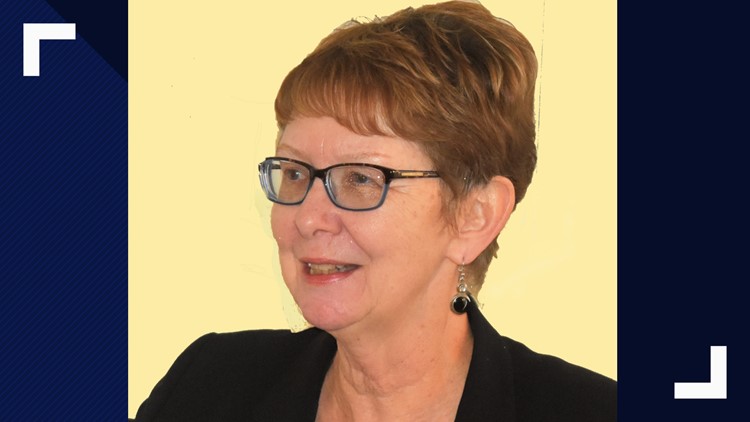DALLAS — WFAA invited each of the nine candidates for Dallas mayor to answer the following questions to help inform voters before the May 4th election.
Here are Alyson Kennedy's responses:
Occupation:
Cashier at Walmart
Education:
During high school in Indianapolis, In. I was impacted by TV coverage of workers and youth who were Black battling racist cops and KKK thugs across the south during the civil rights movement and the overturning of Jim Crow segregation. This showed me what working people are capable of doing. After college, where I was involved in protests against the U.S. war in Vietnam, I moved to Kentucky and taught school. The conditions that students and teachers faced led to me become part of the fight to desegregate Louisville public schools in 1975. I joined the Socialist Workers Party and moved to West Virginia, completed coal mining school and got a job in an underground coalmine. Three months later, I found myself on strike with 160,000 members of the United Mine Workers of America and got one of the most important educations in my life as I saw first-hand what workers can achieve when we are united and use our power.
How long have you lived in the city of Dallas?
I moved to Dallas in 2017.
Why are you running for mayor?
I am running in this election to be a voice for the millions of working people in Dallas and beyond – in cities, small towns and on farms – who even in this temporary “economic recovery” face rising rents, home and farm foreclosures, increasingly unsafe working conditions, having to work two and three jobs to survive, drug epidemics, and falling life expectancy. People ask me a lot, “What would you do as mayor? I explain that if I were elected mayor, it would mean working people were mobilizing in large numbers to fight for far-reaching change, for an independent working-class program; the Socialist Workers Party would help advance that development. The question isn’t what I would do, it’s what working people would be doing to transform ourselves in struggle, becoming capable of taking control of the government and our destiny. Revolutionary change comes from the massive mobilizations of workers and farmers that are led to fundamentally change the conditions we are living under. That is the lesson of the mass fight for Black rights that changed things in this country forever; that’s the lesson of the Cuban Revolution which I support and for ending the U.S embargo.
Prior political experience or civic leadership involvement?
I worked in underground coalmines for 14 years. I participated in several United Mine Workers strikes and the Coal Employment Project, an organization that fought for the rights of women coal miners in hiring and on the job. I have been part of the fight for women’s rights, defense of full access to family planning services, and a woman’s right to choose abortion. In 2003-6 I was among the leaders of a union-organizing battle at the Co-Op underground coal mine in Utah where I worked. The miners there, mostly Mexican immigrants, fought for UMWA representation to win safe working conditions, and to end abuse by the bosses and improved wages, which started at $5.35 an hour. We won widespread solidarity and set a powerful example of how to fight. In Dallas, I participated in protests against the immigration raid in Paris, TX, and the cop killing of Botham Jean. In 2016, I was the Socialist Workers Party candidate for President.
There are a lot of candidates in this race, why should voters choose you over someone else?
Those who I and fellow campaigners have spoken with knocking on doors in working-class neighborhoods across Dallas and in the surrounding Texas region have been given an overwhelmingly positive response to our message. My campaign points to the strikes and demonstrations of teachers last spring who showed one example that working people are ready to fight in our own interests. In West Virginia, the most powerful of these battles, teachers didn’t settle for promises of change, they organized and they won solidarity from other working people to win their demands. Workers I meet want to discuss the conditions we face and they want to talk about a way forward. Many are tired of the dead end of Democratic and Republican party politics, which favor the rich at every turn. The Socialist Workers Party urges working people to act and to support our campaign. It points in the direction of taking power away from the big businesses and banks that exploit workers, farmers, self-employed trades men and women, and small business people, and begin to organize society based on the needs and rights of all those who toil for a living.
In your view, what are the three biggest challenges facing Dallas? Specifically, how do you plan to address them?
1. Amnesty for undocumented workers – Mobilizing working people to fight for amnesty for all undocumented immigrant workers – which is the only way to build a strong labor movement and to organize unions. The bosses use immigration laws to doubly exploit immigrant workers and drag down the wages and working conditions of all working people, creating a massive financial windfall for the employers. The fight for amnesty builds unity among workers, and strengthens the struggles of working people.
2. Building solidarity with working people throughout the world – The Socialist Workers campaign calls for the U.S. military out of the Middle-east and other regions of the world. Stop meddling in the affairs of other countries, whether that be Afghanistan, Iraq, or Venezuela. It is the sons and daughters of working people in Dallas, in Texas, and throughout the country who fight and die in US military interventions, whose only purpose is to protect the economic interests of the wealthy. U.S. wars and military operations have killed tens of thousands in the Mideast, and left many more maimed, homeless, and hungry; veterans sent to fight face scandalous neglect when they return. The attacks on the rights of working people at home and abroad by the wealthy rulers of the U.S. are connected.
3. Support the rights of workers behind bars – Thousands of prisoners in Texas are locked up in cells with no heat in the winter and no air conditioning in the summer. The Socialist Workers Party campaign supports the fight of prisoners who filed lawsuits charging these conditions are cruel and unusual punishment. We demand an end to the death penalty, locking up workers because of exorbitant bail fees and support the right of workers behind bars to access newspapers and books free of censorship by prison authorities.
With growing property taxes, it gets more expensive to live in Dallas every year. If elected, what specifically would you do to address that?
In the Dallas-Fort Worth area, housing and transportation costs have skyrocketed. The capitalist owners, and Democratic and Republican politicians who run government in their interests, couldn’t care less about young workers who can't afford to get a house or apartment of their own, get married, and start a family. The SWP calls for a massive government-financed jobs program, at union-scale wages, to rebuild crumbling infrastructure and provide affordable housing for all.
Dallas now has hundreds of fewer police officers than five years ago. Emergency response times have increased, as well. How do you solve this problem?
When police are called to working class communities, if they come at all, their form of “helping” often leads to police brutality. Violence is part and parcel of a dog-eat-dog ethic in class society which relies on the police to maintain a level of fear and repression in working class communities. Police brutality has been pushed back in recent years and we are seeing guilty cops going to jail. So continuing protests around police brutality are having an effect. We need to continue to fight to prosecute and jail the cop who killed Botham Jean. I had the opportunity to visit Cuba last year. The police brutality that we see in the U.S. doesn’t exist in Cuba because they had a revolution based on human solidarity and putting the interests of working people first. Workers and young people can be part of the May Day International Brigade to Cuba, April 21 to May 5, to see for themselves what the Cuban revolution has accomplished. You can get more information about the brigade by emailing our campaign - dallasswpcampaign@gmail.com.
There is a growing homeless population in Dallas. Prior administrations have struggled to address it. What would you do differently?
The growing homeless population in Dallas and throughout the U.S. is the result of a moral and social crisis of capitalism. Homelessness includes those thrown out of work, employed working people whose wages have been stagnant for decades while rents and mortgages skyrocket, or those forced into bankruptcy by catastrophic medical expenses, or the “new homeless” families packed together with others in a single residence. We are living through a slow-burning economic contraction and financial crisis – a global crisis, with ups and downs, not one of us has seen before. More and more working people recognize that the bosses and their political parties have no solutions to the deteriorating conditions we face. Growing social problems like homelessness are not caused by policy failures by governmental bodies, but of a capitalist system that is incapable of meeting the needs of the majority. A fundamental change, a revolutionary change, is needed to solve these problems.
Major strides have been made in Dallas’ southern sector but challenges remain. What are the two biggest opportunities you have identified?
There are many opportunities to build unity among working people who live anywhere in the city of Dallas and surrounding region. In campaigning in Dallas and beyond I find that working people want to discuss what we face today, and find a way to organize and fight in our own interests.
Have you ever been arrested, charged with a crime or faced criminal proceedings in a court? If yes, please explain:
The Socialist Workers Party was involved in one of the most important trials in US history against government spying and harassment in the 1970s and 1980s. We won that case and forced the government to reveal the many ways – violent and otherwise – that they use to try to undermine those who fight for social changes.
Have you ever been involved in any lawsuits or declared bankruptcy? If yes, please explain:
In 2004 C.W. Mining, owner of the Co-Op Mine in Huntington, Utah, filed a federal civil suit against the United Mine Workers union, its officers, and 17 Co-Op miners, including myself and 120 organizations and individuals who were part of or gave solidarity to the fight of the miners for a union. In the 76-page suit we were accused of “unlawful labor practices” and “defamation.” The company dropped the lawsuit in 2006 after the miners received widespread solidarity in the U.S. and internationally leading to a federal judge dismissing the defamation claims against the miners calling the company’s slander charges against the miners “an attempt to intimidate [Co-Op’s] employees and quell honest discussion concerning labor issues”.
Favorite Dallas restaurant – or night out?
I have many favorite restaurants in Dallas including Odoms BBQ and La Acapulqueña Mexican Restaurant.
Have you ever ridden DART?
DART is not mass transportation. Some of my coworkers take several buses and a train to get to work. When working people begin to take things into our own hands and organize a society to meet human needs, instead of profits this will be a top priority – a public mass transportation system that is reliable, safe and rapid.
Tell us something about yourself – unrelated to politics or this race – that voters probably don’t know.
My two favorite baseball teams are the Chicago Cubs and the Texas Rangers.



